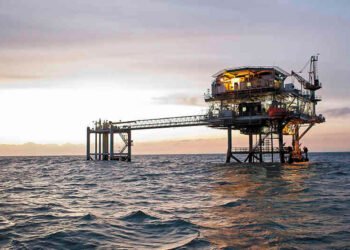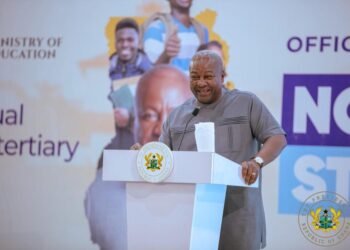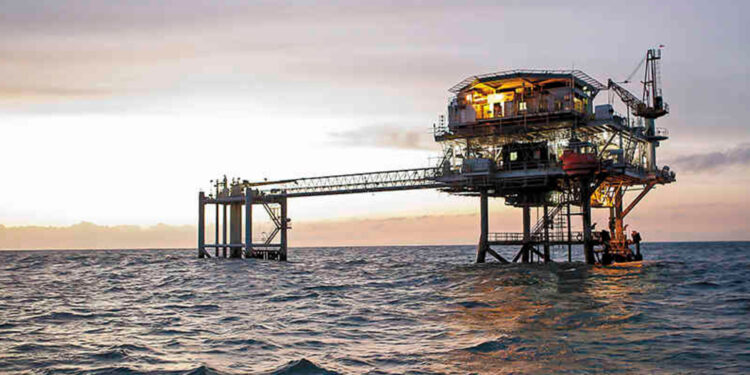President John Dramani Mahama has officially opened the Mining in Motion 2025 Summit in Accra with a bold call to action for African countries to shift focus from extractive exports to value-added industries within the mining sector.
Urging stakeholders to support deeper investment across the downstream value chain, the President emphasized that a reimagined mining approach is critical for building resilient and diversified economies across the continent.
“Africa is rich in gold, bauxite, lithium, cobalt, and other rare earth minerals. Our continent holds 90% of global platinum reserves, 79% of phosphate rocks, and over half of the world’s manganese.
“Mining contributes substantially to our GDP and employment—but it has not transformed the lives of our citizens as it should.”
President John Dramani Mahama
The summit, one of the continent’s most influential mining industry events, convened regional leaders, policymakers, investors, and civil society to explore strategies that can harness Africa’s vast mineral wealth for sustainable development.
Highlighting Ghana’s new policy direction, President Mahama announced a raft of measures aimed at strengthening the mining value chain, including formalizing small-scale mining operations, increasing local participation, and integrating mining into the broader economic architecture.
“We will be investing in the downstream value chain. We must integrate mining into the broader economic framework—that is how we build resilient and diversified economies.
“We believe there should be increased participation by Ghanaians in exploiting our mineral wealth. We welcome investors to partner with us.”
President John Dramani Mahama
The president’s remarks reflect a broader continental shift from resource extraction to industrial transformation.
Ghana, already the continent’s leading gold producer, seeks to expand into refining, mineral processing, and the production of mining-related goods to create jobs and retain more value within the country.
Traditional Leadership Backs Inclusive Mining

Otumfuo Osei Tutu II, King of the Asante Kingdom, also addressed the summit, emphasizing the critical role of traditional leaders in supporting policy reforms and empowering local miners.
“Gold, diamonds and critical minerals represent the best option for sustainable growth for Africa. They are the economic health of economies.
“We have an opportunity to use policies to address industry problems. The Gold Board presents an opportunity for new investments to come in.”
Otumfuo Osei Tutu II, King of the Asante Kingdom
The King’s comments underscored the need to formalize artisanal and small-scale mining (ASM), a sector that employs hundreds of thousands of Ghanaians.
He called for inclusive frameworks that empower local communities while ensuring environmental safeguards.
Regional Integration Through AfCFTA

A key theme at the summit was regional trade and collaboration through the African Continental Free Trade Area (AfCFTA).
Wamkele Keabetswe Mene, Secretary General of AfCFTA, highlighted the importance of integrating African mining industries through harmonized digital tools and regulatory frameworks.
“There are challenges to economic growth such as nationalization of resources and trade wars. Africa must respond to these challenges.
“AfCFTA provides an opportunity to create a regional market and achieve the African Union’s Agenda 2063 of economic integration.”
Wamkele Keabetswe Mene, Secretary General of AfCFTA
Mene emphasized digitalization as a tool to reduce transaction costs, enhance traceability, and promote financial inclusion.
He cited the African Union’s adoption of the Digital Protocol in February 2025 as a transformative step, paving the way for innovations such as gold tokenization and digital trade tracking.
“Digitalization will help create a more transparent and efficient mining ecosystem. It’s also a path toward job creation and poverty eradication.”
Wamkele Keabetswe Mene, Secretary General of AfCFTA
Currently, Ghana’s mining sector contributes about 12% to GDP and remains the country’s largest employer.
According to the Ghana Chamber of Mines, gold exports alone brought in over $11.6 billion in 2024, with the sector contributing GHS 17.7 billion in fiscal payments to government.
Looking ahead, Ghana aims to consolidate its role as a regional mining hub, using platforms like AfCFTA to enhance intra-African trade in mineral resources and value-added products.
The Mining in Motion 2025 summit marks a pivotal moment in Ghana’s mining evolution. President Mahama’s call for deeper downstream investment, regional cooperation, and increased Ghanaian participation signaled a shift toward a more equitable and transformative industry model.
With commitments from traditional authorities, regional institutions, and investors, the summit reinforced a shared vision: to make African mining a driver of prosperity, not just profit.
READ ALSO: Recruitment Fraud Prompts Ghana Immigration Warning



















